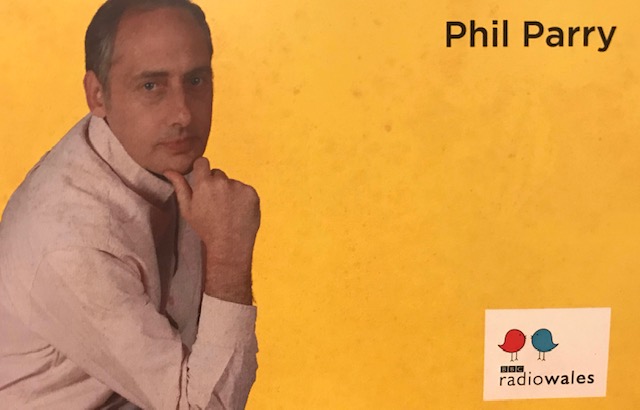- News to celebrate! - 1st March 2026
- Bombs away! - 28th February 2026
- Massaging the truth - 27th February 2026

In an email to BBC staff yesterday the Director General (DG) Tim Davie, admitted that the corporation had been put “… in the spotlight” following a series of huge scandals, but nowhere in it said that he took full responsibility and so must resign.
Our Editor, Welshman Phil Parry, who spent 23 years with the organisation, here looks at this extraordinary situation.
It just seems to go on and on.
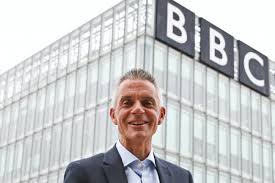
Staff at the BBC were told yesterday executives had been “let down”, but that it was the corporation itself that was “… in the spotlight”, not the man who is ultimately responsible for it all.
You might have thought that after a series of shocking scandals, the Director General (DG) Tim Davie might have fallen on his sword. But apparently not. Let us remind ourselves, therefore, of some of the details – starting with the One Show and Match of the Day presenter Jermaine Jenas.
 He faced claims of ‘inappropriate behaviour’ and was sacked from The BBC over allegedly sending ‘unsolicited’ texts to junior members of staff. Reports have claimed that one female member of staff received unsolicited communications via text from him – they were supposedly ‘flirty’. Others then came forward according to The Sun. However, the source added there was “no suggestion of illegality” on Mr Jenas’s part.
He faced claims of ‘inappropriate behaviour’ and was sacked from The BBC over allegedly sending ‘unsolicited’ texts to junior members of staff. Reports have claimed that one female member of staff received unsolicited communications via text from him – they were supposedly ‘flirty’. Others then came forward according to The Sun. However, the source added there was “no suggestion of illegality” on Mr Jenas’s part.
We have no way of knowing if this alleged message sending had been going on for some time or is very recent, but what is certain is that The BBC is keen to paint a picture of decisiveness. An internal source who backs managers there told The Times: “We investigated him immediately and fired him pretty fast. There are no excuses for anyone in power abusing their positions. He’s a man in power messaging some runner”. Mr Jenas made an extraordinary statement about his sacking on radio with talkSPORT.

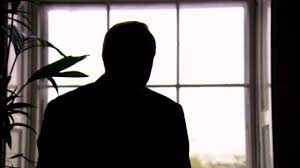
Others, though, are less happy. One former senior executive told me: “The BBC is attempting to display decisiveness after the Huw Edwards & Savile scandals to help restore its public image.
It’s cosmetic. He’s relatively small fry compared to Lineker…”.
As this comment alludes to there have been a series of major controversies on Mr Davie’s watch, when The BBC has hit the headlines for all the wrong reasons.

Gary Lineker had posted a controversial tweet, apparently attacking the UK Government’s policy towards refugees, however his supporters (including Mr Jenas) declared that this was from his personal account, and carpeting him undermined the concept of free speech.
He was then allowed back on air, but this apparent U-turn provoked a storm of criticism, and politicians as well as sports stars poked fun at the corporation over it.
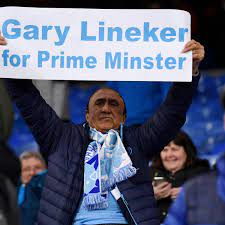
Some Tory MPs were furious at the decision to bring Mr Lineker back, proclaiming that it gave him “carte blanche” to say what he liked on social media, despite Mr Davie insisting that he would “abide by the editorial guidelines”.
An ‘independent review’ was to look into the use of social media by staff, although to critics (including me) this looked like meaningless twaddle to cover up the fact that managers had messed up.
Then there are the others. Jimmy Savile, for instance, sexually abused hundreds of children and women at the height of his fame. It is now believed he preyed on around 500 vulnerable victims as young as two years old at institutions including The BBC’s broadcasting studios, 14 hospitals and 20 children’s hospitals across England.

Obviously much of this abuse took place before Mr Davie took over as BBC Director General (DG), but the extent of it has only come out recently so he must take the fall.
This came in the context of the astonishing Huw Edwards business, which was very much with Mr Davie at the helm. Edwards had moving images of a child aged between seven and nine, and 41 photographs – seven category A images in levels of criminality, 12 category B pictures, and 22 category C. The category A images – the most serious kind – were mostly of children aged 13 to 15.

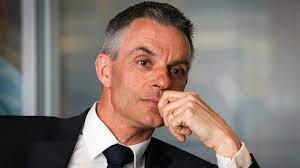
Yet Mr Davie thought they had done well. He defended his corporation’s handling of the controversy, when it paid Edwards hundreds of thousands of pounds even though it knew he had been arrested on child pornography charges. The BBC were also to keep the BAFTAs won for Royal coverage fronted by Edwards, and individual awards he received would ‘remain under review’.
 But staff inside the organisation were distressed. One whistleblower said they were “disappointed” not to have heard more about an internal inquiry’s progress, a further critic said that it felt like “things have been swept under the carpet”.
But staff inside the organisation were distressed. One whistleblower said they were “disappointed” not to have heard more about an internal inquiry’s progress, a further critic said that it felt like “things have been swept under the carpet”.
The background is unbelievable. On a different issue, Edwards was suspended in July 2023 after reports in The Sun said he had paid a young person for sexually explicit images. These condemnatory remarks come in the context of what is now known about him. His admission of what he did made the front page of almost every single UK newspaper.
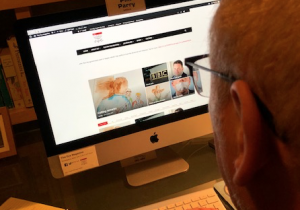
There has also been consternation about why he was a hero to some in the Welsh nationalist or independence communities. One leading Public Relations (PR) and marketing executive who wished to remain anonymous, told The Eye: “It has always seemed incredible to me, and now this just emphasises it. In the past we have even had Welsh nationalist or independence clients wanting to put Huw Edwards’ face on their products!”.
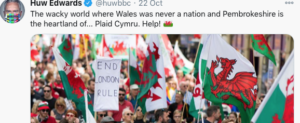 In one announcement on Twitter/X Edwards highlighted (ironically): “The wacky world where Wales was never a nation and Pembrokeshire is the heartland of… Plaid Cymru. Help!”. The picture he attached underneath it, was of protesters carrying Welsh flags aloft with a placard of END LONDON RULE clearly visible near the centre of the photograph.
In one announcement on Twitter/X Edwards highlighted (ironically): “The wacky world where Wales was never a nation and Pembrokeshire is the heartland of… Plaid Cymru. Help!”. The picture he attached underneath it, was of protesters carrying Welsh flags aloft with a placard of END LONDON RULE clearly visible near the centre of the photograph.
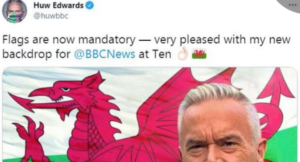 He was ordered to drop a post of himself in front of a Welsh flag, which he proclaimed (once more ironically) was a “backdrop for @BBCNews at Ten”, and responded (again ironically): “Gutted my pro-flag tweet has been cut down in its prime. By order. But it will be back tomorrow – by popular demand. Meanwhile enjoy this magnificent flag – one of my favourites. Hashtag SixNationsRugby Hashtag FRAvWAL” – with a series of emojis included.
He was ordered to drop a post of himself in front of a Welsh flag, which he proclaimed (once more ironically) was a “backdrop for @BBCNews at Ten”, and responded (again ironically): “Gutted my pro-flag tweet has been cut down in its prime. By order. But it will be back tomorrow – by popular demand. Meanwhile enjoy this magnificent flag – one of my favourites. Hashtag SixNationsRugby Hashtag FRAvWAL” – with a series of emojis included.
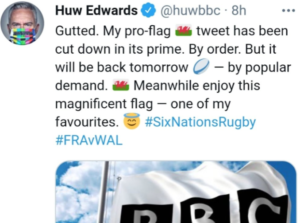 His remarks, though, were not met with wild acclaim by the leader of the Welsh Conservatives in the Welsh Parliament/Senedd Cymru (WP/SC) Andrew RT Davies, who has said on Twitter/X that The BBC was: “Employing presenters who openly mock… (Britain)… Ridiculous!”, and linked it to the ‘Gutted’ post.
His remarks, though, were not met with wild acclaim by the leader of the Welsh Conservatives in the Welsh Parliament/Senedd Cymru (WP/SC) Andrew RT Davies, who has said on Twitter/X that The BBC was: “Employing presenters who openly mock… (Britain)… Ridiculous!”, and linked it to the ‘Gutted’ post.
He has ‘liked’ a tweet declaring that he should be “President of an Independent Cymru”, apparently flying in the face of the rules on impartiality (which Mr Davie has endorsed), and there was also a call on the internet for Edwards to be knighted because of his presentation of a Royal funeral.
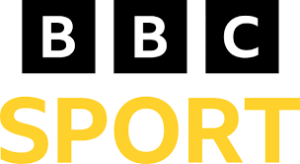
 He attacked a critique of the break-up of the UK by celebrated historian and journalist Max Hastings. Edwards tweeted that there were “errors”, and after Edwards’ diatribe the website Nation.Cymru (NC) (which is supported by the taxpayer unlike The Eye) published a ‘news’ piece saying: “Huw Edwards slams former Telegraph editor for anti-Welsh language article”, and it has ‘reported’ many ‘stories’ about his exploits. For example, following a remark about Welsh nationalist party Plaid Cymru (Plaid), it ran a ‘story’ that: “Broadcaster Huw Edwards has protested the BBC’s new rules on using social media by unleashing a cascade of Welsh flags”.
He attacked a critique of the break-up of the UK by celebrated historian and journalist Max Hastings. Edwards tweeted that there were “errors”, and after Edwards’ diatribe the website Nation.Cymru (NC) (which is supported by the taxpayer unlike The Eye) published a ‘news’ piece saying: “Huw Edwards slams former Telegraph editor for anti-Welsh language article”, and it has ‘reported’ many ‘stories’ about his exploits. For example, following a remark about Welsh nationalist party Plaid Cymru (Plaid), it ran a ‘story’ that: “Broadcaster Huw Edwards has protested the BBC’s new rules on using social media by unleashing a cascade of Welsh flags”.

The exposure of Edwards caused a huge storm when it emerged that he had been paid between £475,000 and £479,999 in the 2023-24 financial year, making him the broadcaster’s third-highest-paid presenter overall.
Only now has he been ASKED to give some of it back. In a letter to staff the BBC Chair Samir Shah said that Edwards had “behaved in bad faith” (surely an under-statement!), saying that the corporation believed he had taken his salary despite knowing he was to plead guilty to the offences.
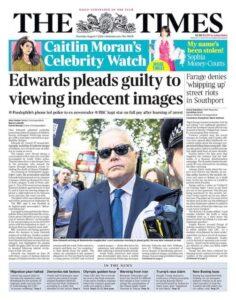 Edwards, formerly The BBC’s most high-profile newsreader, continued to earn his salary for FIVE months after he was arrested on three counts of making indecent images of children, during which time he was paid more than £200,000.
Edwards, formerly The BBC’s most high-profile newsreader, continued to earn his salary for FIVE months after he was arrested on three counts of making indecent images of children, during which time he was paid more than £200,000.
He had allegedly given £35,000 to a teenager in exchange for the sexually explicit images, and when he was finally ‘outed’ by his wife a news item about it stated: “Vicky Flind, the wife of news reader Huw Edwards, has named him as the BBC presenter facing allegations over payments for sexually explicit images in a statement issued on his behalf”.
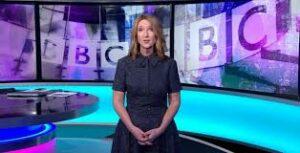
Harmful claims then emerged about Edwards’ actions generally at the BBC, with it being claimed that he had sent ‘menacing’ texts to one individual, and further allegations emerged following the original ones made in The Sun (the paper said it had a dossier of his alleged activities, but has chosen not to publish).
He was also accused of sending inappropriate messages to BBC employees (there are perhaps echoes here of what Mr Jenas is alleged to have done!). According to Newsnight, one current staff member claimed they were contacted on social media by him, and the messages left them feeling uncomfortable as well as awkward. The messages were reportedly suggestive in nature, appeared to be flirtatious, and referred to the appearance of Mr Edwards’ colleague. “There is a power dynamic that makes this inappropriate”, the staff member said. Another BBC employee alleged that Mr Edwards had also sent them a private message on social media which commented, too, on their appearance and gave them a “cold shudder”.
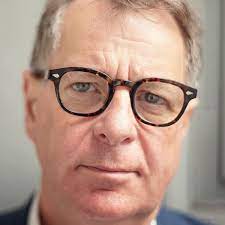
During the days in which Edwards went unnamed as the presenter at the centre of the scandal, the publicist and strategist Mark Berkowski told Times Radio: “We’ve got a situation where it’s an ongoing car crash and the BBC is so glacial about how they’re dealing with this, because this is a 21st century problem”,
David Keighley, the former BBC news producer and director of News-watch, spoke of “reputational damage” to the man’s colleagues.
Journalists who covered the extraordinary incident, have apparently emphasised criticism that The BBC effectively clammed up about it. For instance, one Sky News journalist said at the time: “The fact all of us broadcasters have asked, have put in requests again and again to speak to the director general, and the fact that he has only given an interview to his own people is not a good look for the BBC”.
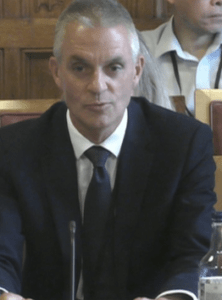
Yet senior executives seemingly took a different view. During a pre-arranged House of Lords (HoL) Communications Committee (CC) hearing about a week afterwards, Mr Davie, said: “We have been in touch with the complainant”, and that due to the “history of this industry… we should all be concerned and appropriately diligent around the abuse of people in powerful positions”. As the Edwards issue came hard on the heels of the controversy about Mr Lineker, Mr Davie’s position now looks increasingly untenable.
In that hearing he sat alongside the then acting chairwoman, Dame Elan Closs Stephens (who, like Edwards, is from Wales). She and Mr Davie were forced to answer important questions about the corporation’s attitude during the affair, following suggestions that it did not properly investigate the original complaint. Dame Elan told peers that despite “huge pressure” to name Edwards, the corporation “had a duty to act with some calm and rationality in the face of lack of rationality and lack of calm”. She was BBC chair for almost all of the period in question.

The BBC is “… in the spotlight”, as well as Mr Davie himself although he won’t quit even though both are under “huge pressure”…
The memories of of Phil’s extraordinary decades long award-winning career in journalism (including his many years at the BBC) as he was gripped by the rare neurological disabling condition Hereditary Spastic Paraplegia (HSP), have been released in a major book ‘A Good Story’. Order it now.









